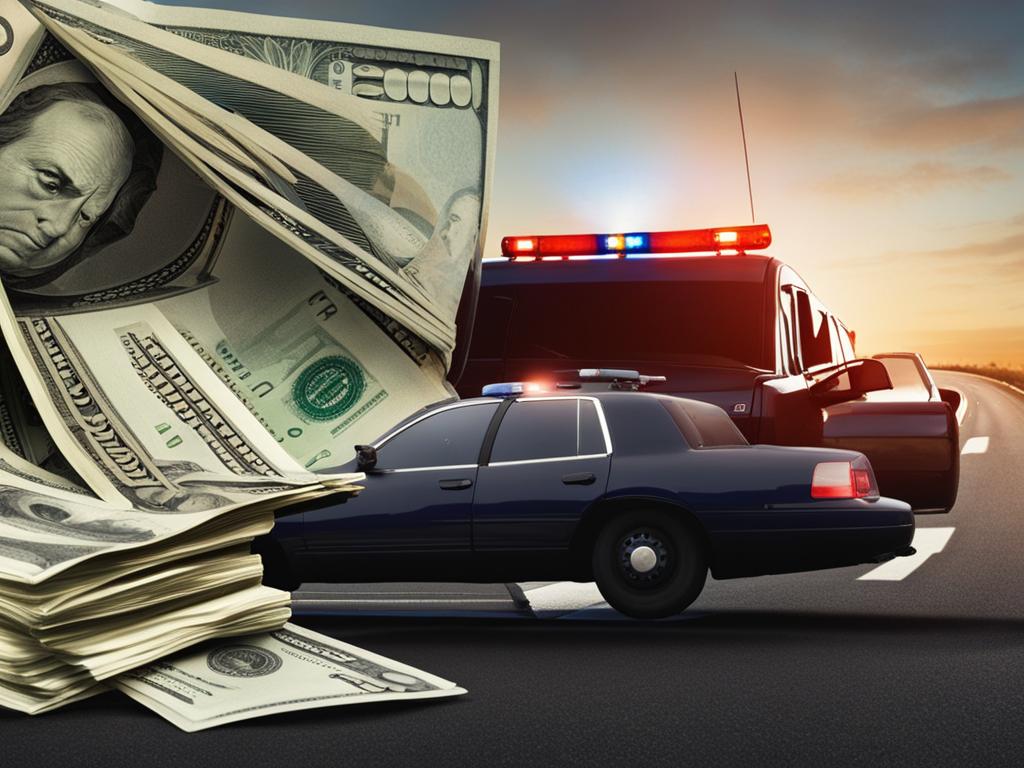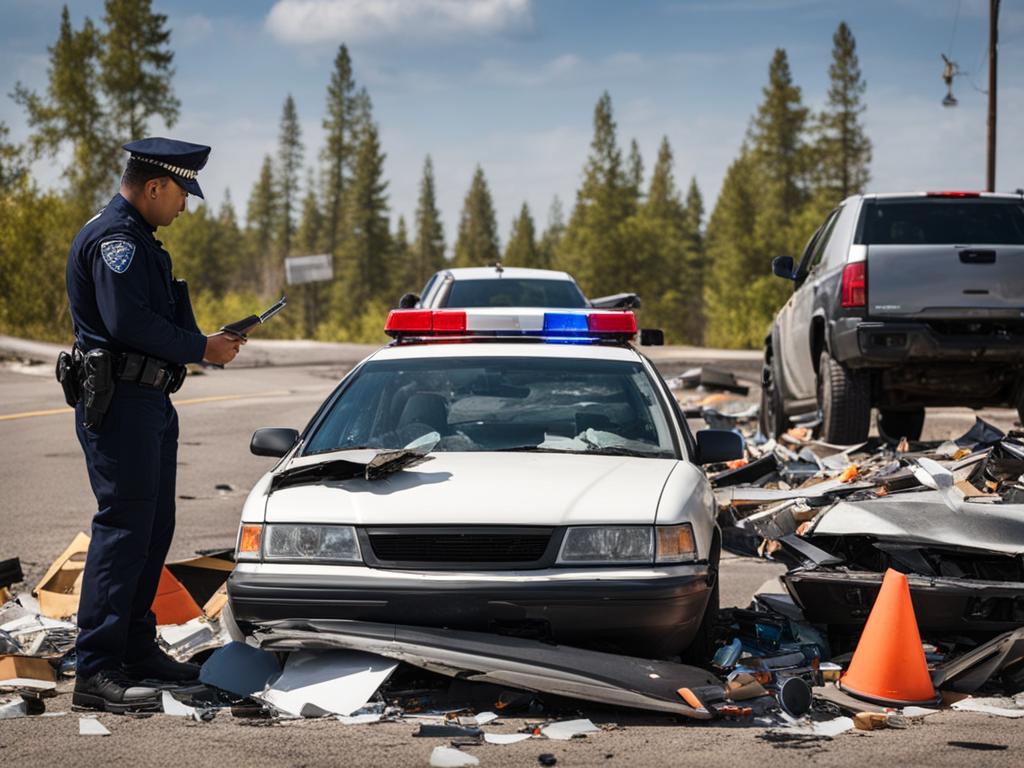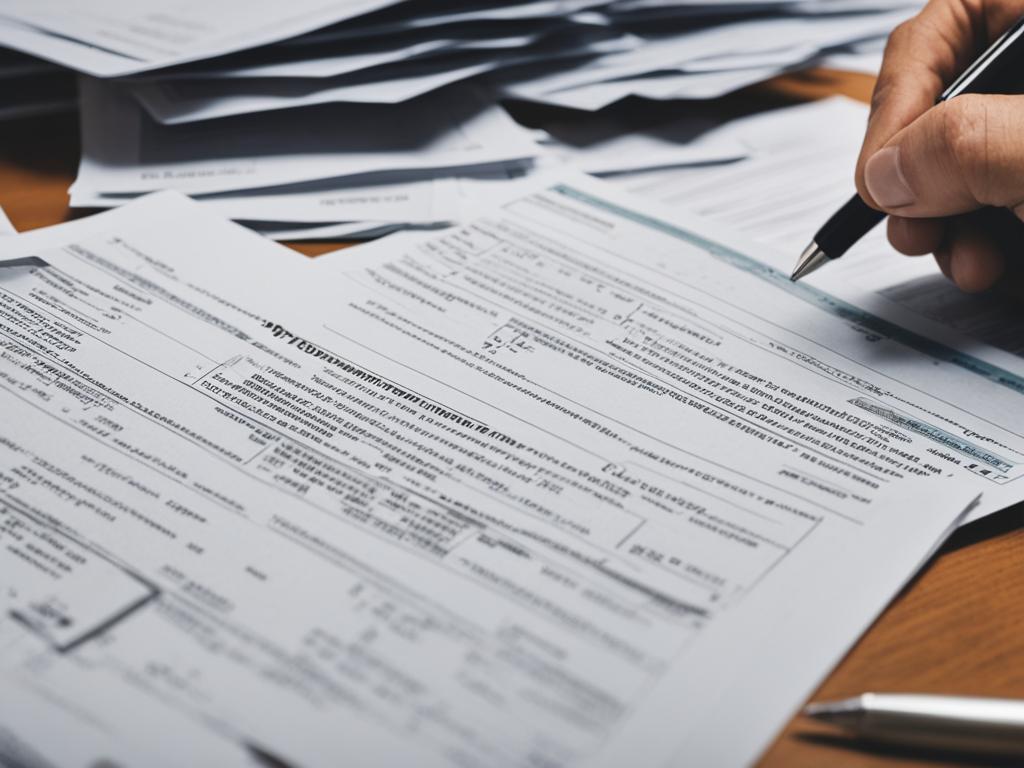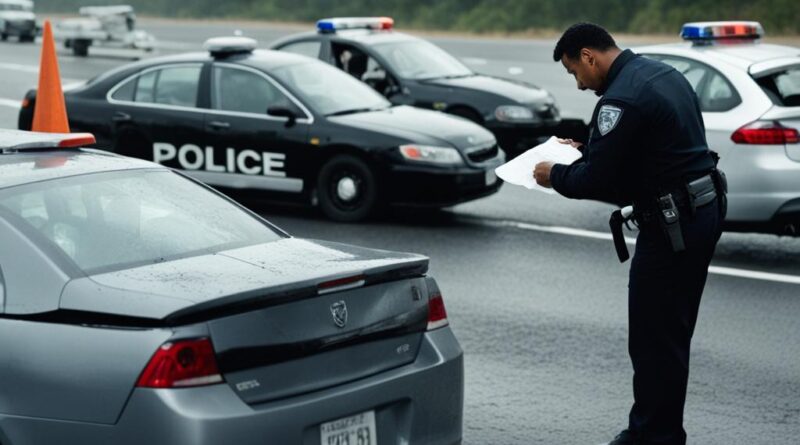Pulled Over in Another’s Car Without Insurance? Know the Consequences
Driving someone else’s car without insurance can have severe consequences and legal implications. If you are pulled over in a borrowed car and don’t have insurance, you may face fines, license suspension, and vehicle impoundment. It’s important to understand the potential repercussions and how to navigate this situation.
Key Takeaways:
- Driving someone else’s car without insurance can result in fines, license suspension, and vehicle impoundment.
- California, like most states, has minimum car insurance requirements that must be met when driving someone else’s car.
- If caught driving uninsured in another person’s car, you may face penalties such as fines and license suspension.
- Being uninsured in another person’s car can lead to legal repercussions, including personal liability for damages and injuries in an accident.
- If you have a lapse in coverage, there are options to obtain insurance, but not all providers cater to higher-risk drivers.
California Car Insurance Laws
When driving someone else’s car in California, it is essential to familiarize yourself with the state’s car insurance laws to ensure compliance and avoid legal penalties. California, like most other states, has specific insurance requirements that drivers must meet when operating another person’s vehicle.
The liability auto insurance coverage requirements in California are as follows:
| Coverage Type | Minimum Coverage |
|---|---|
| Bodily Injury Liability (Per Person) | $15,000 |
| Bodily Injury Liability (Per Accident) | $30,000 |
| Property Damage Liability | $5,000 |
These requirements mean that drivers must have at least $15,000 of bodily injury liability coverage per person, $30,000 of bodily injury liability coverage per accident, and $5,000 of property damage liability coverage.
It is crucial to understand that driving someone else’s car without meeting these insurance requirements can result in significant consequences. Violations may lead to fines, license suspension, and other penalties. To ensure compliance and protect yourself legally, it is essential to have adequate insurance coverage when driving someone else’s car in California.
Penalties for Driving Without Insurance in California
If you are caught driving someone else’s car without insurance in California, you can face severe penalties and financial consequences. It is important to understand the potential penalties associated with driving uninsured in another person’s vehicle.
Penalties for driving without insurance
When driving someone else’s car without insurance, you may be subject to the following penalties:
- Fines ranging from $100 to $500 for a first offense
- Up to $500 in fines for subsequent offenses within 3 years
- Possible impoundment of the vehicle
- Driver’s license suspension
California is known as a “no pay, no play” state, which means that uninsured drivers may not be able to sue an insured at-fault driver for non-economic damages. This can further limit your ability to seek compensation in the event of an accident.
Driving without insurance in someone else’s car is not only illegal but also puts you at significant risk. It is important to prioritize obtaining the necessary insurance coverage before driving any vehicle, especially if you plan to borrow or use someone else’s car.

Legal Repercussions of Driving Uninsured in Another Person’s Car
Driving uninsured in someone else’s car can have serious legal implications and potential repercussions. One of the major concerns is the personal liability you may face if you are involved in an accident while driving without insurance. In such cases, you can be held responsible for property damage and injuries caused to others.
When you drive uninsured in another person’s car and an accident occurs, the victims have the right to sue you directly for compensation. This can result in significant financial obligations, including paying for medical bills, property repairs, and other damages.
It is crucial to understand the legal consequences and potential financial burden associated with driving uninsured in someone else’s vehicle. Consulting with a traffic lawyer in these situations can help you understand your rights, navigate the legal complexities, and explore possible legal options.
“Driving uninsured in another person’s car can lead to personal liability for property damage and injuries caused to others.”
Consequences of Being Uninsured in Another Person’s Car
Being uninsured in another person’s car can lead to various consequences. If you cause an accident, you may be responsible for all the damages and medical expenses incurred by injured parties. In addition to financial liability, you can face fines, license suspension, and vehicle impoundment.
When driving someone else’s car without insurance, you put yourself at risk of significant financial burdens. In the event of an accident, you may have to pay for property damage, medical expenses, and other related costs out of pocket. These expenses can quickly add up and put a strain on your financial situation.
Furthermore, driving without insurance can result in legal penalties. Depending on the state and jurisdiction, you may face fines ranging from a few hundred dollars to thousands of dollars for driving someone else’s car without insurance. Additionally, your driver’s license could be suspended, making it difficult for you to commute to work or fulfill your day-to-day responsibilities.
Vehicle impoundment is another consequence you could face if caught driving someone else’s car without insurance. Law enforcement agencies have the authority to impound the vehicle, leaving you without access to transportation until you pay the necessary fees and provide proof of insurance coverage.
It’s essential to understand the potential repercussions before driving someone else’s car without insurance. By ensuring you are adequately insured or have the appropriate permission from the vehicle owner, you can avoid these financial and legal consequences.
“Driving uninsured in someone else’s car can have serious consequences. From hefty fines to vehicle impoundment, the penalties for not having insurance while driving someone else’s car can cause significant financial and personal hardships.”
The Financial Consequences
When you drive uninsured in another person’s car, you become personally responsible for any damages or injuries that occur due to an accident. This means that if you are at fault, you may have to bear the financial burden of repairing the other driver’s vehicle, as well as covering medical expenses and property damage.
Insurance provides a safety net by transferring the financial responsibility to the insurance company, protecting you from potential financial devastation. However, if you do not have insurance coverage, you may have to pay out of pocket for these costs, which can be substantial.
Potential Legal Penalties
Driving uninsured in someone else’s car can also result in legal penalties. Law enforcement agencies take driving without insurance seriously, as it puts not only the uninsured driver but also other road users at risk.
The specific penalties for driving someone else’s car without insurance vary depending on the state and jurisdiction. However, common consequences include fines, license suspension, and even vehicle impoundment. These penalties are in place to encourage compliance with insurance requirements and promote safe driving practices.
Protecting Yourself and Others
By understanding the consequences of driving uninsured in someone else’s vehicle, you can take steps to protect yourself and others. It’s essential to ensure that you have proper insurance coverage or obtain permission from the vehicle owner to drive their car.
Additionally, if you frequently drive someone else’s car, you may want to consider non-owner car insurance. This type of policy provides liability coverage when driving a vehicle that you do not own, offering financial protection in case of an accident and helping you avoid the consequences of driving uninsured.
Remember, driving uninsured in another person’s car can have serious repercussions. Take responsibility for your actions, protect yourself and others, and ensure you are adequately covered before getting behind the wheel.

Driving someone else’s car without insurance can have severe consequences, both financially and legally. It’s important to understand the potential repercussions and take the necessary steps to protect yourself and others.
Obtaining Insurance After a Lapse in Coverage
If you have allowed your auto insurance to lapse, there may still be options to obtain coverage. However, not all insurance providers will offer coverage to higher-risk drivers with a lapse in coverage. It’s important to explore your options and find an insurance company that specializes in covering higher-risk drivers. Getting insurance after a lapse in coverage can also help in your legal defense case if you have been cited for driving without insurance.
If you have recently experienced a lapse in auto insurance coverage, it’s crucial to take immediate action to protect yourself and meet the legal requirements. Here are some steps to consider:
- Research Insurance Companies: Look for insurance providers that offer coverage to drivers with a lapse in coverage. Not all insurers are willing to take on this risk, so it’s essential to find companies that specialize in helping higher-risk drivers.
- Compare Quotes: Obtain quotes from multiple insurance companies to evaluate pricing and coverage options. It’s important to consider both the cost and the level of coverage provided.
- Consider Non-Standard Insurance: Non-standard insurance companies specialize in covering higher-risk drivers, including those with a lapse in coverage. While these policies often come with higher premiums, they can provide the necessary coverage when traditional insurers decline.
- Provide Relevant Information: When applying for insurance coverage, be prepared to provide information about the length and reason for the lapse in coverage, as well as any driving records or incidents during that period. The more detailed and accurate the information you provide, the better insurers can assess your risk.
- Consider a High Deductible: Opting for a higher deductible can help reduce your premiums. However, be sure to choose a deductible that you can comfortably afford in the event of an accident or claim.
- Insurance Discounts: Inquire about any available discounts, such as safe driving programs, multi-policy discounts, or pay-in-full discounts. These can help lower your overall insurance costs.
- Rebuild Your Driving Record: By maintaining continuous insurance coverage and practicing safe driving habits, you can gradually improve your driving record and become eligible for more favorable rates in the future.
By following these steps and actively seeking out insurance options, you can obtain coverage after a lapse and protect yourself legally. Remember, it’s crucial to address the lapse as soon as possible to meet legal requirements and avoid further legal complications.
Cost of Auto Insurance in California
When it comes to car insurance in California, it’s essential to consider the costs involved. The average cost of car insurance in the state is around $2,190 per year, which translates to approximately $182.50 per month.
However, it’s important to note that this figure is just an average, and the actual cost of insurance can vary significantly depending on various factors. Some of the key factors that can impact your insurance rates include:
- Your age: Younger drivers typically pay higher premiums compared to older, more experienced drivers.
- Your location: Insurance rates can vary based on where you live due to factors such as the level of traffic congestion, crime rates, and the likelihood of accidents.
- Your vehicle: The make, model, and year of your car can also affect your insurance rates. Generally, more expensive or high-performance vehicles tend to have higher insurance premiums.
- Your driving record: Your history of accidents, tickets, and other infractions can impact how much you pay for insurance. Safe drivers with a clean record usually qualify for lower rates.
To ensure that you’re getting the best possible rates for your specific situation, it’s crucial to shop around and compare quotes from different insurance providers. You may be surprised by the differences in rates offered by various companies.
Remember, choosing the right insurance coverage is not just about finding the lowest price. It’s also crucial to consider the level of coverage and the insurer’s reputation for customer service and claims handling.

By taking the time to research your options and find the insurance provider that best meets your needs, you can secure adequate coverage while keeping your costs as affordable as possible.
How to Appeal a Fine for Driving Without Insurance
If you have been fined for driving without insurance and believe you were indeed insured at the time, you may have the option to appeal the fine. Appealing a fine for driving without insurance requires presenting your case in court and providing sufficient evidence that you were insured on the day you were pulled over.
To strengthen your appeal, gather all relevant documentation, such as insurance policy documents, receipts, or any other proof of insurance coverage. It’s crucial to clearly demonstrate that you had valid insurance in place when the incident occurred. Additionally, consult with a traffic attorney who specializes in handling insurance-related cases to guide you through the appeals process effectively.
Proper documentation and legal guidance are key to appeal a fine for driving without insurance. Present your evidence in court, exude professionalism, and rely on expert advice to maximize your chances of a successful appeal.
However, it’s essential to note that even if the judge clears you of wrongdoing, you may still be required to pay an administrative fee. Therefore, it’s crucial to consult with your attorney to understand the potential financial implications of your appeal.
Navigating the legal process can be complex, and having professional representation can help minimize the penalties involved. Your attorney will ensure that your rights are protected and present your case in the best possible light.
Consulting with a Traffic Attorney
When challenging a citation for driving uninsured, it’s highly recommended to consult with a traffic attorney experienced in insurance-related cases. An attorney can provide personalized advice based on your specific circumstances, increasing your chances of a successful appeal.
Here are a few reasons why having a traffic attorney by your side can be beneficial:
- An attorney has in-depth knowledge of traffic laws and regulations.
- They understand the legal procedures and requirements for appealing fines.
- Attorneys have experience navigating the court system and dealing with insurance-related cases.
- They can provide guidance on gathering and presenting evidence in court.
- An attorney will protect your rights and advocate for your best interests.
By seeking legal representation, you increase your chances of a positive outcome in your appeal and minimize the potential consequences of driving uninsured.

Minimizing the Penalties
While appealing a fine for driving without insurance can help reduce or dismiss the charges, it’s essential to take steps to minimize the penalties in case the appeal is unsuccessful.
Here are a few measures you can consider:
- Obtain insurance as soon as possible: Showing proof of insurance after the incident demonstrates your commitment to complying with the law.
- Participate in defensive driving courses: Completing a defensive driving course can demonstrate your dedication to improving your driving skills and may result in a lighter sentence or fine reduction.
- Comply with all court orders: It’s crucial to follow any orders or requirements set forth by the court to avoid further penalties or legal issues.
By taking these steps, you can demonstrate your responsibility and commitment to adhering to the law, potentially mitigating the overall impact of the citation.
Conclusion
Handling a traffic stop in a borrowed car without insurance can be a daunting experience, but it’s important to stay calm and take the necessary steps to navigate the legal implications. First and foremost, cooperate with law enforcement during the stop and provide them with the required documentation. Remember to be respectful and courteous throughout the interaction.
After the traffic stop, it’s crucial to consult with a traffic lawyer who can provide you with expert guidance and advice. They can help you understand the legal repercussions you may face and assist you in taking the appropriate actions to rectify the situation.
To avoid future problems, it’s essential to obtain insurance coverage for any vehicle you drive, even if it’s borrowed. Ensuring you have the necessary insurance protection not only helps you comply with the law, but it also helps mitigate potential legal and financial consequences in the event of an accident or traffic stop.
FAQ
What are the consequences of driving uninsured in someone else’s vehicle?
Driving uninsured in someone else’s car can lead to fines, license suspension, vehicle impoundment, and potential legal liabilities in the event of an accident.
What are the legal implications of being uninsured in another person’s car?
Being uninsured in another person’s car can result in fines, license suspension, and potential lawsuits if you are involved in an accident and are found at fault.
What are the insurance requirements when driving someone else’s car?
In California, drivers are required to have a minimum amount of liability auto insurance coverage, including bodily injury liability coverage and property damage liability coverage.
What are the penalties for driving someone else’s car without insurance?
If caught driving someone else’s car without insurance in California, you can face fines ranging from $100 to $500 for a first offense, and up to $500 for subsequent offenses within 3 years. Your vehicle may also be impounded, and your driver’s license may be suspended.
What are the potential legal repercussions of driving uninsured in someone else’s vehicle?
If you are involved in an accident while driving uninsured in someone else’s car, you may be personally liable for property damage and injuries to others. The victims can sue you directly for compensation.
What are the consequences of being uninsured in another person’s car?
Being uninsured in another person’s car can lead to financial liabilities for damages in an accident, as well as fines, license suspension, and vehicle impoundment.
How can I obtain insurance after a lapse in coverage?
If your auto insurance has lapsed, you can explore options with insurance providers specializing in covering higher-risk drivers. Getting insurance after a lapse in coverage may also help with your legal defense if cited for driving without insurance.
What is the average cost of auto insurance in California?
The average cost of car insurance in California is around $2,190 annually or $182.50 per month. However, the actual cost varies based on factors such as age, location, vehicle, and driving record.
How can I appeal a fine for driving without insurance?
If you believe you were insured at the time of the citation, you can appeal the fine. Appearing in court with sufficient evidence of insurance coverage on the day you were pulled over is necessary. However, there may still be administrative fees even if the judge clears you of wrongdoing.
How can I handle a traffic stop in a borrowed car without insurance?
If pulled over in a borrowed car without insurance, it’s important to remain calm, cooperate with law enforcement, and consult with a traffic lawyer for guidance on navigating the legal implications. Taking steps to rectify the situation and obtain insurance can help mitigate potential legal repercussions.



![:special day care seevice [deepstroke]](https://bizsdaily.com/wp-content/uploads/2024/01/special-day-care-seevice-deepstroke-390x205.jpg)
